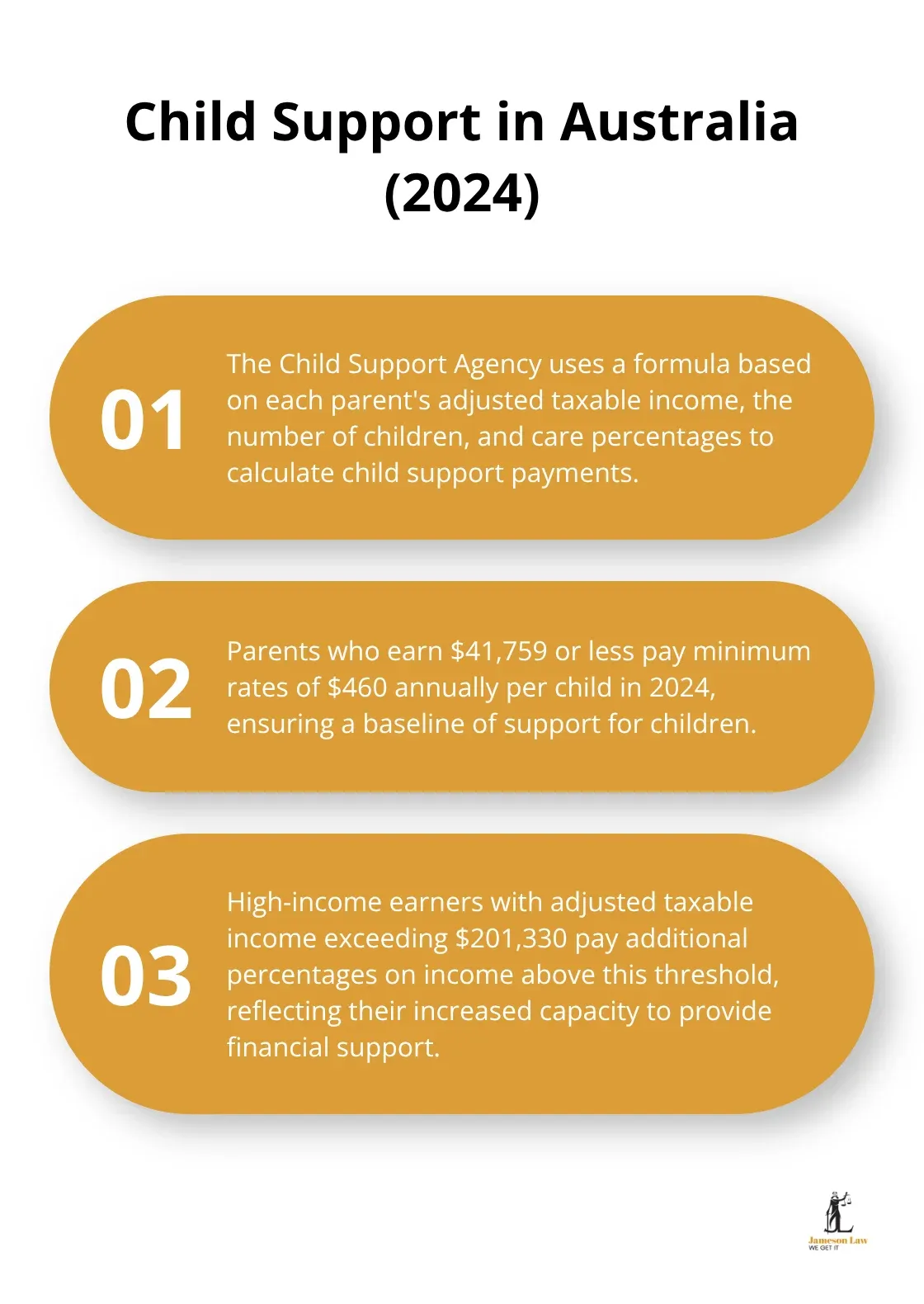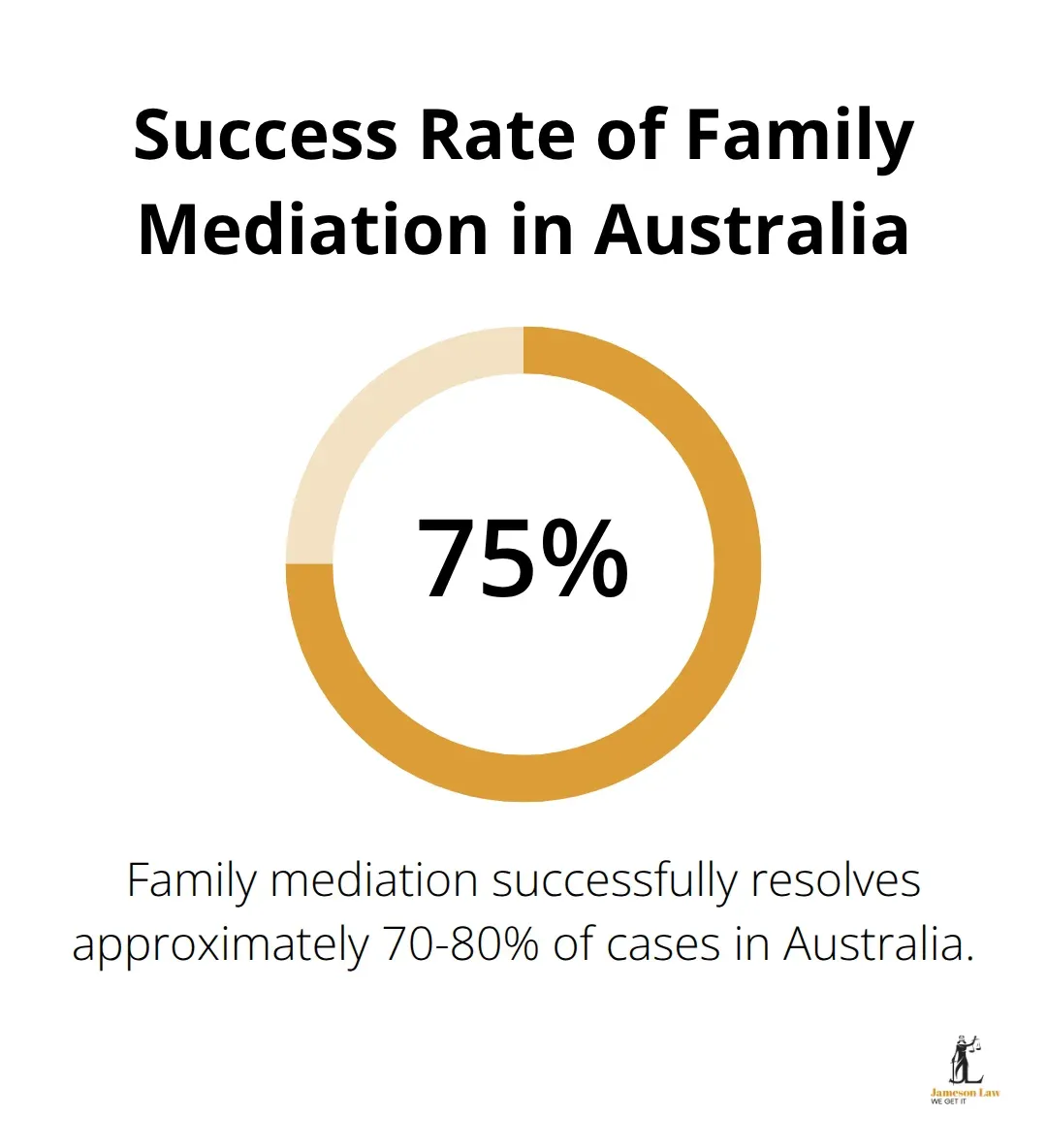Family relationships evolve constantly, bringing new legal considerations at every stage. From early partnerships to parenting responsibilities and potential separations, understanding your rights protects your family’s future.
We at Jameson Law recognise that family law life presents complex challenges requiring expert guidance. This comprehensive guide walks you through the legal landscape at each major life milestone.
Early Relationships and Marriage
Should You Sign a Prenup in Australia?
Prenuptial agreements, known as Binding Financial Agreements in Australia, override standard property settlement laws when relationships end. The Family Law Act 1975 allows couples to create these agreements before marriage, during marriage, or after separation. The 2023 divorce rate is the lowest since the implementation of the Family Law Act 1975, with 2.3 divorces per 1,000 residents aged 16 years and over, which makes financial protection essential for many couples.
To be binding, a Financial Agreement must meet certain technical requirements, including independent legal advice for both parties, full financial disclosure, and proper execution to remain valid. Courts can set aside agreements that are unconscionable, obtained through fraud, or where circumstances have changed dramatically since the parties signed them.
De Facto Relationships Carry Equal Legal Weight
De facto couples gain the same property rights as married couples after they live together for two years under the Family Law Amendment Act 2008. The proportion of couples who cohabitate increased from 6% in 1986 to 16% in 2011 according to Australian Bureau of Statistics figures.

De facto partners can claim property settlements, spousal maintenance, and superannuation splits without formal marriage. However, courts require evidence of shared finances, joint property ownership, domestic arrangements, and public recognition as a couple to prove a de facto relationship exists.
Early Financial Planning Prevents Future Disputes
Smart couples establish separate and joint financial structures from the start of their relationship. They open joint accounts for shared expenses while they maintain individual accounts for personal expenses (this creates clear boundaries between shared and separate assets).
Couples should document pre-relationship assets through bank statements, property valuations, and investment records to protect inherited wealth and individual contributions. Regular financial reviews track asset growth and contribution patterns that courts examine during property settlements.
Joint bank accounts, shared leases, and beneficiary nominations on superannuation establish clear relationship status. Property that couples purchase during cohabitation becomes part of the shared asset pool, regardless of whose name appears on title deeds (even if only one partner holds legal title).
The next major life stage brings new legal considerations when couples decide to start a family and navigate the complex world of parental rights and responsibilities.
Parenting and Child-Related Matters
Courts Focus on Children’s Best Interests Above All Else
Australian family courts prioritise children’s welfare over parental preferences when they make custody decisions. The Family Law Act establishes that both parents share equal parental responsibility until a court orders otherwise, regardless of who initiated the separation.
Courts examine each parent’s capacity to provide stable housing, emotional support, and consistent care routines. The 2006 family law reforms introduced principles of equal shared parental responsibility and children’s rights to meaningful relationships with each parent.
Parents who demonstrate flexibility with arrangements and prioritise their children’s needs typically receive more favourable outcomes than those who create conflict. Courts assess each parent’s willingness to facilitate the child’s relationship with the other parent.
Child Support Calculations Follow Strict Government Formulas
The Child Support Agency uses a formula based on each parent’s adjusted taxable income, the number of children, and care percentages. Parents who earn $41,759 or less pay minimum rates of $460 annually per child in 2024.

High-income earners with adjusted taxable income that exceeds $201,330 pay additional percentages on income above this threshold. The formula accounts for new partners’ children and shared care arrangements that exceed 14% of nights per year.
Parents can apply for administrative changes when income drops by more than 15%, but the Agency requires evidence through tax returns or employer statements. Private collection allows parents to negotiate payment methods, while Agency collection includes enforcement powers like wage garnishment and asset seizure.
Adoption and Surrogacy Require Extensive Legal Preparation
State governments control adoption laws, with wait periods that exceed two years for most applicants who seek local adoptions. Prospective adoptive parents must complete mandatory education programs, undergo police checks, and participate in home studies that approved agencies conduct.
International adoptions through Hague Convention countries require additional federal approvals. Surrogacy arrangements need independent legal advice for all parties before conception occurs (altruistic surrogacy remains legal nationwide while commercial surrogacy stays prohibited).
Birth mothers retain legal rights to change their minds until formal consent periods expire, typically 30 days after birth depending on the state jurisdiction. These complex arrangements require careful legal preparation to protect all parties involved.
When relationships face challenges or reach their end, couples must navigate the complex terrain of property division and legal separation procedures.
What Happens When Your Relationship Ends
Property Division Follows Four-Step Assessment Process
Australian courts divide relationship property through a systematic process that examines contributions, future needs, and fairness. The Court has power to make financial or property orders in relation to marriages under Part VIII of the Family Law Act 1975. Courts first identify all assets and liabilities in the relationship pool, which includes property, superannuation, business interests, and debts that parties accumulated during cohabitation. The Family Court considers initial contributions, financial contributions made over time, and non-financial contributions like homemaking and childcare when it determines each party’s percentage entitlement.
The court then adjusts percentages based on future needs and examines factors like age, health, income capacity, and primary care responsibilities for children. A 60-40 split often occurs when one parent has primary custody and limited income potential, while 50-50 divisions suit couples with similar incomes and shared parenting arrangements. Property settlements must be finalised within 12 months of divorce or two years after de facto separation (or parties need court permission to proceed).
Spousal Maintenance Requires Proven Financial Need
Spousal maintenance applications succeed only when applicants demonstrate genuine financial need and their former partner’s capacity to pay. Courts examine each party’s income, assets, age, health, and potential to earn when they determine maintenance amounts and duration. The Australian Bureau of Statistics reports that women over 45 experience significant income drops post-separation, which makes maintenance claims more viable for older applicants with limited career prospects.
Maintenance orders typically last 2-3 years to allow recipients time for retraining or workforce re-entry, though permanent orders apply in cases that involve disability or advanced age. Courts prefer property settlements over maintenance arrangements because clean break principles reduce future conflict between former partners.
Mediation Resolves Most Family Disputes
Family mediation through accredited practitioners resolves approximately 70-80% of cases according to studies and reports on mediation success rates in Australia. Mediation costs range from $150-300 per hour compared to court proceedings where legal costs can be substantial for contested property matters. Couples must attempt mediation before they file court applications unless family violence or urgency exists.

Successful mediation requires both parties’ willingness to negotiate and full financial disclosure through comprehensive asset and liability statements. Agreements reached through mediation become legally binding when properly documented and offer the same enforceability as court orders while they maintain privacy and reduce emotional stress for all family members.
Final Thoughts
Family law life requires proactive planning rather than reactive responses to relationship changes. Smart couples establish clear financial boundaries early, document pre-relationship assets, and understand their rights before disputes arise. The statistics show that 78% of marriages in 2011 were preceded by cohabitation (making early legal awareness essential for protection of interests).
Professional family law advice becomes necessary when relationships face significant changes like separation, property disputes, or complex parental arrangements. Courts examine detailed financial records and contribution patterns, so proper documentation from the relationship’s start prevents costly disputes later. The 12-month deadline for property settlement applications after divorce makes timely legal action vital.
We at Jameson Law provide expert family law services across NSW. Our team offers tailored legal support for property settlements, parental arrangements, and financial agreements. We understand that family law matters require both technical expertise and compassionate guidance during emotionally challenging times.













